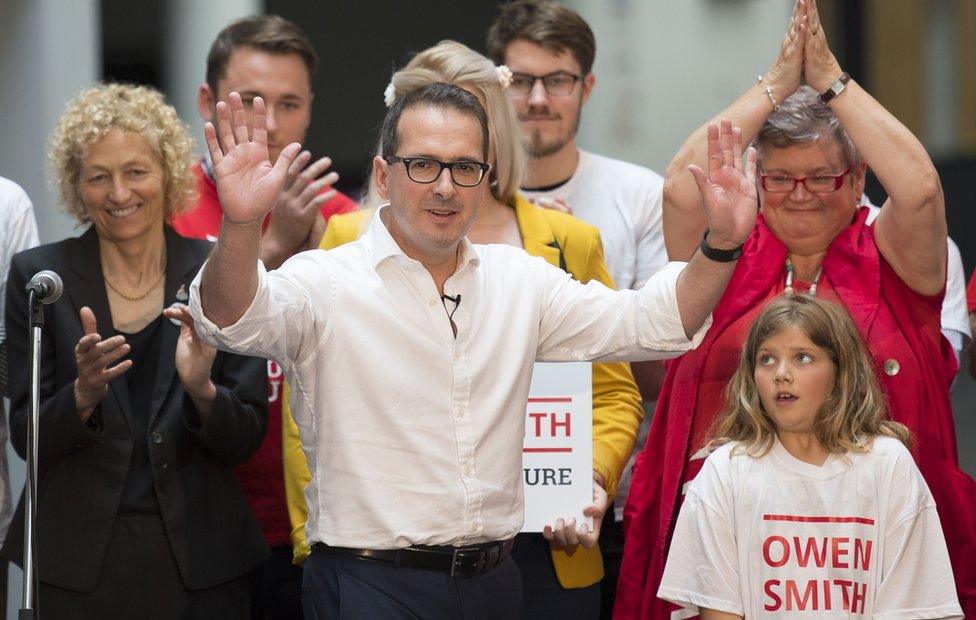Jeremy Corbyn rejects Smith's party president offer
- Published
Jeremy Corbyn: 'It sounds to me a bit like a director of football"
Jeremy Corbyn has dismissed an offer from challenger Owen Smith of becoming party president in the event his rival wins the Labour leadership.
He told BBC Newsnight it was "a job that doesn't exist" and compared the role to that of "director of football".
He also said his attitude to rebels who opposed his leadership would be one of "charity" rather than "malice".
Mr Smith says Mr Corbyn is "not a leader" but could "speak for the party" to the wider membership as president.
He said he would make Mr Corbyn party president if he managed to unseat him as leader, praising him for helping Labour "rediscover its radical roots" but saying he had "sloganised" about anti-austerity but had "never spelt out what he wants to spend".
Mr Corbyn, who launched his campaign to be re-elected Labour leader on Thursday, following the challenge from Mr Smith, told BBC Newsnight: "Owen Smith has offered me unopposed election to a job that doesn't exist.
"I don't want to be president of the party, I'm not even sure we should have a president of the party. What's a president for? It sounds to me a bit like a director of football. So no."
"The creation of a position of president of the party would actually require a rule change, and a constitutional change. It's not in his gift to offer unopposed election to anything - unless he has some control over the whole electorate that I haven't been told about."

Owen Smith launched his bid to be Labour leader on 17 July
Asked whether he would accept rebels who opposed his leadership back into the party, Mr Corbyn said: "Let's have some charity towards people - not malice. I don't do malice."
He said he had at no point felt like resigning - and said he has been coping with the pressure just fine. "Do I sleep well? Yes. Do I do other things? Yes. Do I read widely? Yes. Look at me I'm very happy."
During the interview, Mr Corbyn was asked if he stuck by his statement on the morning of the referendum result when he called for article 50 to be invoked "immediately".
"I may not have put that as well as I should have done. My view was, and is, that at some point article 50 is going to be invoked, obviously, it has to be."
But he made it clear he does not favour a second referendum. "I think you have to respect the result of the referendum, whether you welcome it or not, and respect the result which was, unfortunately, a vote to leave."
No rush to 'barriers'
On immigration, he told Newsnight: "I have made the point all along that the single market does include free movement of labour and if you go away from that you're not in the single market.
"Let's look at the other ways of dealing with it first, rather than rushing to immigration."
Some 183,000 people have signed up in the 48-hour registration period to vote in the ballot which pits Mr Corbyn against Mr Smith, with the result due to be announced on 24 September.
They paid £25 each to become registered supporters by Wednesday's deadline, enabling them to have a say in the contest along with party members who had signed up before 12 January and people who joined affiliated trade unions and organisations before that date and who register by 8 August.
In his speech launching his campaign for re-election, Mr Corbyn vowed to tackle the "five ills of 21st Century Britain" - inequality, neglect, prejudice, insecurity and discrimination.
He also said that there would be a "full and open selection process" to choose every would-be Labour MP if new constituency boundaries were in place before 2020, in which current MPs would be able to "put their name forward".
Mr Smith said the Labour leader was effectively threatening to sack Labour MPs - Mr Corbyn's team said he had simply been setting out the existing rules.
However, the current rules state that selections following boundary changes are only open to sitting MPs.
Watch the full interview on BBC Newsnight on 21 July at 22:30 BST on BBC Two.